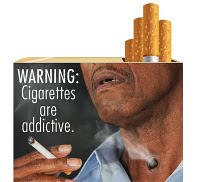Federal judge rules proposed warning labels on cigarettes are too biased, blocks them from appearing on packs

 The graphic warning labels that were going to start appearing on cigarette packages in the fall of 2012 have gotten hung up in court, with a federal judge ruling Monday they “impinge on the tobacco companies’ right to free speech,” reports James R. Carroll of The Courier-Journal.
The graphic warning labels that were going to start appearing on cigarette packages in the fall of 2012 have gotten hung up in court, with a federal judge ruling Monday they “impinge on the tobacco companies’ right to free speech,” reports James R. Carroll of The Courier-Journal.
District Judge Richard Leon’s ruling will prevent the labels from being used until tobacco companies resolve a lawsuit against the federal government regarding the issue, something that could end up in the Supreme Court and take years. Leon said the five tobacco companies involved in the lawsuit “have demonstrated a substantial likelihood that they will prevail on the merits of their position.”
Leon said the labels do not objectively warn about the risks of smoking and that tobacco companies “will suffer irreparable harm” if a ruling is not made on the label’s constitutionality.
The labels, which were released by the Food and Drug Administration this summer, show graphic images of rotting teeth, a man with a zipper-like scar down the length of his chest and a man with smoke coming out of a tracheotomy tube. It is the first time in 25 years warning labels on cigarette packages have been altered, a move that was made possible when the FDA was given the authority to regulate tobacco products as part of a 2009 law.
FDA’s aim is to “reduce the number of smokers by 213,000 by 2013 and save between $221 million and $630 million every year over the next 20 years,” Rob Stein of the Washington Post reported in June.
Leon wrote that the images cause an emotional response that provokes “the viewer to quit, or never to start smoking: an objective wholly apart from disseminating purely factual and uncontroversial information. Thus, while the line between the constitutionally permissible dissemination of factual information and the impermissible expropriation of a company’s advertising space for government advocacy can be frustratingly blurry here — where these emotion-provoking images are coupled with text extolling consumers to call the phone number ‘1-800-QUIT’ — the line seems quite clear.”
Matthew Myers, president of the Campaign for Tobacco-Free Kids, called Leon’s ruling wrong. “If allowed to stand, this ruling would make it impossible to implement any effective warning labels,” he said. An FDA spokesman said the agency is reviewing the ruling and had no immediate comment. More than 40 countries have pictorial health warnings on their cigarettes packages, including Canada. (Read more)